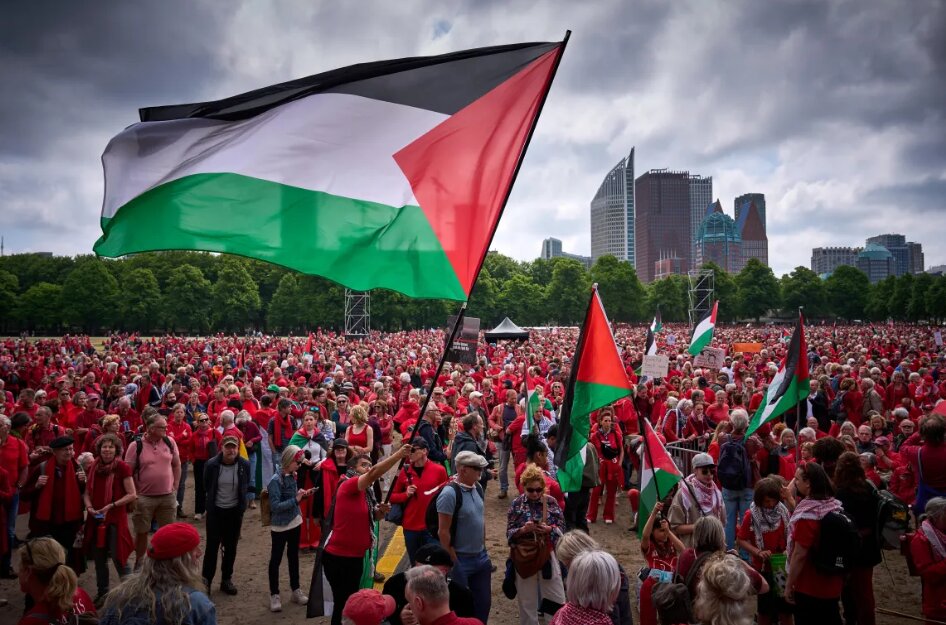From trade bans to cultural boycotts: The Netherlands’ comprehensive stand for Gaza justice

TEHRAN – Standing by as catastrophe advances in Gaza—fueled by Israel’s unrelenting military aggression—gross human rights violations, and a deepening humanitarian crisis should compel the world, especially European countries, to take stronger and united action. This means pressing Israel to halt the violence and extending unequivocal support to the people in dire need in Gaza.
The bold intervention by the Netherlands in September 2025 remains a crucial wake-up call, underscoring the urgent necessity of immediate sanctions, trade restrictions, and diplomatic isolation. Such measures are essential for ensuring accountability and preventing further atrocities.
Dutch government decree targets settlement imports
A pivotal Dutch government decree on September 11, 2025, exemplifies the decisive measures Europe must now adopt en masse: Foreign Minister David van Weel announced an immediate ban on imports of goods from Israeli Jewish settlements in the occupied West Bank, leveraging a rapid executive mechanism to enforce this restriction.
This unflinching condemnation of Israel's illegal settlement expansion—deemed unlawful by the vast majority of the international community under international law—targets settlement products precisely while preserving essential trade with Israel proper, offering a blueprint for calibrated yet firm economic leverage.
Cultural boycotts signal escalating diplomatic offensive
Complementing this economic frontline, the Dutch government's alliance with Ireland and fellow EU states in threatening a boycott of the Eurovision Song Contest 2026 should Israel participate signals an escalating cultural and diplomatic offensive that every European country—and indeed the global community—must amplify without delay. This coordinated defiance against Israel's Gaza atrocities marks a vital pivot from passive diplomacy to aggressive accountability.
Grassroots protests challenge Dutch complicity
On the ground, Dutch civil society's unrelenting fervor from August 31 through early September 2025—where hundreds nationwide joined work walkouts, clanging saucepans and chanting "No supporting genocide" and "Free Palestine" across over 50 sites, including Amsterdam's Wereld Museum—highlights the grassroots momentum that must propel governments everywhere to act. Organizers framed their demands within the nation’s binding duties under the 1948 Genocide Convention, condemning governmental inaction as outright complicity.
Universities, as epicenters of moral awakening, have amplified this urgency: at the University of Amsterdam, pro-Palestinian disruptions to the academic year saw students and faculty insist on boycotts of Israeli entities tied to military endeavors, transforming campuses into beacons of solidarity. These actions compel academic institutions globally to sever complicit ties and advocate for sanctions.
Beyond streets and halls, Dutch voices flood social media via groups like "Amsterdam for Palestine," rallying for instant ceasefires, unfettered humanitarian access, and Gaza's justice—tools for real-time orchestration and global amplification that every nation must harness to build unyielding campaigns for accountability.
At policy's core, humanitarian imperatives demand immediate global enforcement: Prime Minister Dick Schoof's insistence on expediting Gaza aid and restoring vital infrastructure, while decrying civilian suffering—especially children's—and violence against journalists, spotlights press freedom's role in unmasking war crimes. Yet this is merely a starting point; the world, led by Europe, must enact binding sanctions and aid mandates to translate words into life-saving deeds.
Political divisions reveal ethical crossroads
The very division in the opinion in the Netherlands—with polling revealing strong support for harsher stances against Israel on the backdrop of diplomatic warnings precipitating ministerial resignations—is the occasion for the ethical crossroads wherein countries must choose justice over geopolitics and act on calls for an arms embargo and trade suspensions so as not to be viewed as complicit in an atrocity.
Regionally, the Netherlands' early September mobilizations synchronized with tens of thousands in Brussels drawing a "red line" against Israeli aggression, clamoring for continent-wide sanctions—a transnational surge testing Europe's resolve and demanding emulation worldwide to yield tangible policy shifts.
A global mandate for sanctions and solidarity
Ultimately, September 2025 cements the Netherlands as a vanguard for Palestinian rights through intertwined state edicts and societal fire, but this is not a stand-alone victory, it is a call to action for every country - especially in Europe - to take all necessary sanctions, embargoes, and recognitions against Israel, while stabilizing Gaza.
In this democratic enactment of the most dominant destructive historical narrative, inaction is also action - act, or leave the historical record to judge us all complicit.
